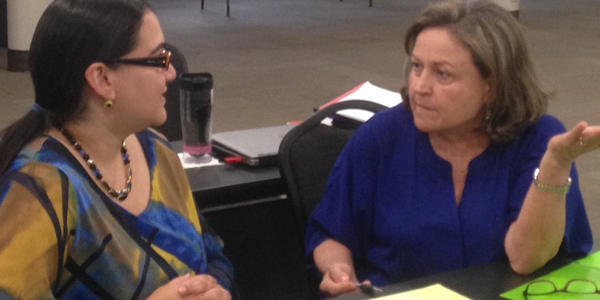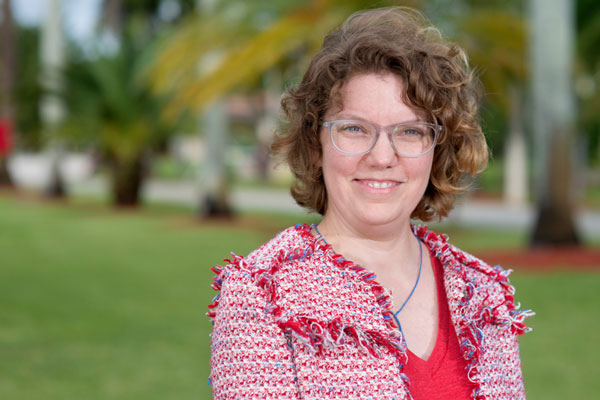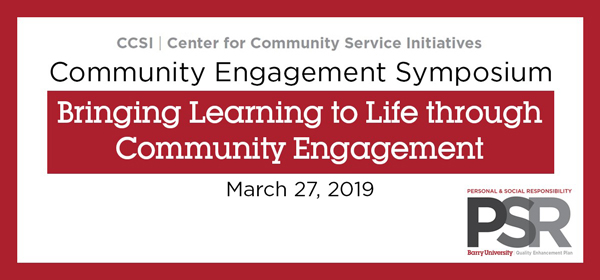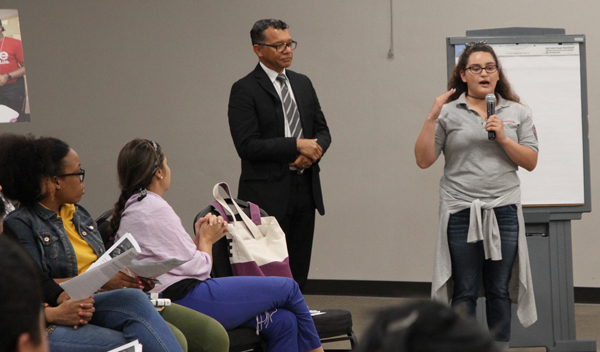|
|
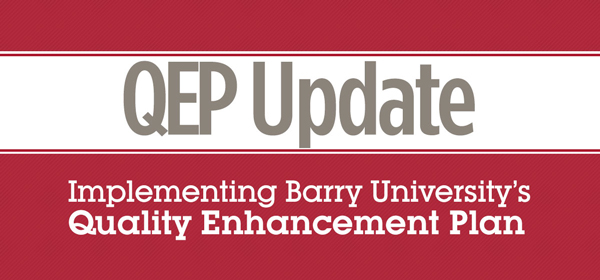
|
Sections of Nine Courses Added to the 'Personal and Social Responsibility' List
Sections of nine courses were recently given the personal and social responsibility (PSR) designation. The designation indicates that the course sections meet the PSR criteria by intentionally emphasizing elements of personal and social responsibility such as ethical behavior, perspective consciousness, and civic engagement. The Quality Enhancement Plan (QEP) Implementation Committee approved applications from faculty members in the College of Nursing and Health Sciences as well as the College of Arts and Sciences. Sections of the following course have been added to the PSR list:
Meanwhile, nine of the faculty members teaching designated courses participated in a reflection meeting. Sumera Ackbarali, Dr. Paige Banaji, Dr. Lawrence “Larry” Byrne, Dr. Pamela Hall, Dr. Tamara Hamilton, Dr. Ana Jimenez, Dr. M. Margarita Nodarse, Fr. Jorge Presmanes, and Fr. Mark Wedig shared their experiences with the QEP Implementation Committee. |
QEP Implementation Committee Welcomes New Member
Bachelor of Social Work (BSW) Program Director Ashley Wright has been appointed to the QEP Implementation Committee. Wright (MSW, Tulane University) joined Barry’s School of Social Work at the start of this academic year. She teaches Introduction to Social Work; and her current macro practice interests include policy changes and social justice in the arenas of immigration, environment, and chronic poverty. As an administrator, Wright aims “to provide a program that excels in academics, is rich with diversity, offers inspiring experiences, and empowers students to build careers that serve the community with professionalism and passion.” The QEP Implementation Committee is composed of faculty members and administrators from the Division of Academic Affairs and the Division of Mission and Student Engagement. |
CCSI Accepting Proposals for Presentations at the Community Engagement Symposium
The Center for Community Service Initiatives (CCSI) is accepting proposals for presentations at Barry’s sixth annual Community Engagement Symposium. Students, faculty, staff, and community partners are invited to submit proposals for oral (or podium) and poster presentations by February 1. The theme of the symposium is “Bringing Learning to Life through Community Engagement.” Community engagement includes experiential learning practices such as service-learning, community-based research, fieldwork, study abroad, capstones, and internships. Proposals should address the theme of the symposium and identify the experiential learning practice that was implemented. Successful proposals will specify the course or co-curricular project, the social or community issue addressed, the related activities undertaken, and the actual learning outcomes. Proposals should also emphasize how learning “came to life”—that is, how learning was enhanced or enriched and made meaningful for the student. Scheduled for March 27, the 2019 symposium will highlight student learning outcomes of community engagement practices in the context of Barry’s Quality Enhancement Plan (QEP) titled “Fostering Personal and Social Responsibility through Experiential Learning.” For additional information on the symposium, contact the CCSI at service@barry.edu. |
Deliberative Dialogue Series Continues on February 21
This academic year’s Deliberative Dialogue Series will continue on February 21 with a forum focused on the opioid epidemic in Florida. Titled “Florida’s Opioid Epidemic: A Serious Public Health Issue,” the 90-minute forum will be held in the Andreas 112 conference room, beginning at 4 p.m. Organized by the Center for Community Service Initiatives (CCSI), the Deliberative Dialogue Series is an approach to civic learning and engagement. The series brings together campus and community stakeholders to weigh perspectives on current social issues of shared concern and to work toward practical solutions. Deliberative Dialogue is one of several co-curricular events designated as “PSR.” Co-curricular programs, projects, and events that carry the “PSR” are geared to achieve at least one of the six personal and social responsibility outcomes of the QEP. The outcomes are categorized as (1) Ethical and Moral Reasoning, (2) Engaging Diverse Perspectives, and (3) Community Engagement and Collaboration. Each category contains two specific student learning outcomes. For further information on the Deliberative Dialogue Series, contact the CCSI. |
Variety of Relevant Resources Available at QEP Website
The QEP website has information on a variety of resources to support the implementation of Barry’s Quality Enhancement Plan. The resources include scholarly articles, books, fact sheets, and other publications on experiential learning, civic engagement, social responsibility, and similar topics. A video that illustrates key concepts of the QEP is also available at the website. The key concepts are responsibility, community, social justice, civic engagement, service, and diversity. Barry’s QEP is focused on personal and social responsibility through experiential learning. For further information on the QEP and to access experiential learning resources, send an email to qep@barry.edu. |
|
If you wish to unsubscribe or update your email subscription, please visit our email preference center. ©2018 Barry University. All Rights Reserved. |

